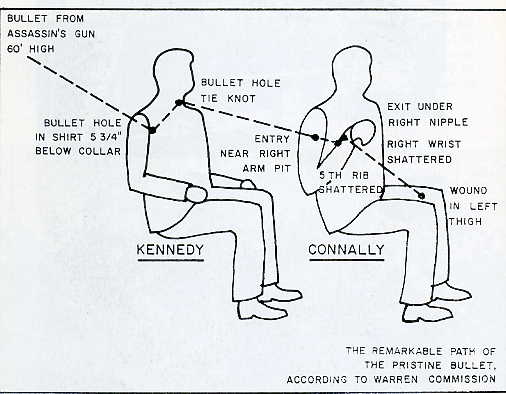JFKMLKRFK.com is best viewed on a desktop/laptop, not a cell phone. New layout coming in 2025.
new: MLK holiday Jan. 20, 2025 is inauguration day for the insurrectionist.
Warren Commission cover up
related page: House Select Committee on Assassinations - 1978 report admitted a second gunman, but declined to investigate further
The Warren Commission conclusion of a "lone gunman" depends upon the " single bullet theory" created by Warren Commission attorney Arlen Specter (later rewarded for his work by being made a US Senator from Pennsylvania)
The single bullshit theory - or magic bullet theory - is the only way to pretend that one rifle was used to create all of the wounds, if you don't believe this claim then the Warren Commission thesis of the "lone nut" is invalidated.
Some commentators have suggested the Warren Commission would more accurately be called the Warren - Dulles Commission, given the large role Allen Dulles had on it. Dulles was the CIA director under Eisenhower and then at the start of Kennedy's term. JFK fired Allen Dulles after the 1961 Bay of Pigs fiasco, since Dulles and his cohorts had lied to the President, claiming the invasion would trigger a successful uprising against Fidel Castro's government. Kennedy realized he had been set up, that the Bay of Pigs attack had been intended to force him to commit US troops to overthrow the government of Cuba and he declined to do that.
Dulles became a staunch opponent of the Kennedy administration and then, after his JFK's removal from office, lobbied to be put on the investigation. This was a severe conflict of interest that was ignored by the media.
An analogy: if someone having major conflicts with their neighbor is found murdered, and their neighbor is appointed to determine what happened, the potential for a coverup would seem obvious.
Tuesday, 01 October 2013 19:31
David Reitzes Meets Michael Shermer: Send In the Clowns
Written by James DiEugenio
But it was not just the public at large who did not buy this fairy tale. It was people in power, in both Washington and Texas. As David Talbot and Robert Kennedy Jr. have both revealed, Bobby Kennedy, who was Attorney General at the time, did not buy the Warren Commission. As author Joe McBride reveals in Into the Nightmare, Governor John Connally did not buy the absurd conclusions of the Commission either. In 1982, he told journalist Doug Thompson that he thought the Warren Report was complete bunk. When Thompson asked Connally if he thought Oswald killed Kennedy, the former governor replied, "Absolutely not. I do not for one second believe the conclusions of the Warren Commission." (McBride, p. 418) The new president, Lyndon Johnson, in a phone call, said he did not buy the single bullet theory. The person he was talking to did not buy it either. And that person is quite significant to the matter at hand.
Because the person on the line was Senator Richard Russell, and he served on the Warren Commission. (Gerald McKnight, Breach of Trust, pgs. 283-84)

"One must give the CIA (and the assassination sponsors that were even further in the shadows) their due for having devised and executed a brilliant setup. They had played out a scenario to Kennedy's death in Dallas that pressured other government authorities to choose among three major options: a war of vengeance against Cuba and the Soviet Union based on the CIA's false Mexico City documentation of an assassination plot; a domestic political war based on the same documents seen truly, but a war the CIA would fight with every covert weapon at its command; or a complete coverup of any conspiracy evidence and a silent coup d'etat that would reverse Kennedy's efforts to end the Cold War. Lyndon Johnson, for his part, took little time to choose the only option he felt would leave him with a country to govern. He chose to cover up everything and surrender to Cold War prerogatives. However, he was not about to attack Cuba and the U.S.S.R. His quick personal acceptance of what had to be would only emerge more gradually in public. Rather than end it all quickly and heroically against Castro and Krushchev, he would ride gently, through the 1964 election, into the full fury of Vietnam."
-- James Douglass, "JFK and the Unspeakable," pp. 81-82
related websites:




JFKMLKRFK.com - by Mark Robinowitz - updated
January 13, 2025